- Wayne Community College is a student-centered, public, two-year college with an open-door admissions policy. The College serves individuals, business and industry, and other organizations with quality, economical, and convenient learning opportunities.
School Highlights
Wayne Community College serves 3,996 students (30% of students are full-time).
The college's student:teacher ratio of 10:1 is lower than the state community college average of 13:1.
Minority enrollment is 48% of the student body (majority Black), which is equal to the state average of 48%.
Quick Stats (2025)
- Enrollment: 3,996 students
- In-state tuition: $2,396
- Out-state tuition: $8,540
- Student:teacher ratio: 10:1
- Minority enrollment: 48%
- Source: Integrated Postsecondary Education Data System (IPEDS)
Top Rankings
Wayne Community College ranks among the top 20% of public schools in North Carolina for:
Category
Attribute
Completion Rates
Debt For Students
School Overview
The teacher population of 415 teachers has stayed relatively flat over five years.
Wayne Community College
(NC) Community College Avg.
Carnegie Classification
Associate's Colleges: Mixed Transfer/Career & Technical-High Traditional
Associate's Colleges: Mixed Transfer/Career & Technical-High Nontraditional
Institution Level
At least 2 but less than 4 years
At least 2 but less than 4 years
Institution Control
Public
Public
Total Faculty
415 staff
256 staff
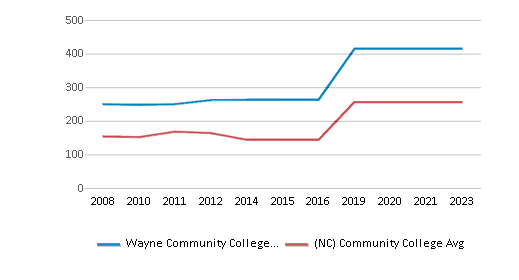
School Calendar
Student Body
The student population of Wayne Community College has grown by 35% over five years.
The student:teacher ratio of 10:1 has increased from 7:1 over five years.
The Wayne Community College diversity score of 0.64 is less than the state average of 0.66. The school's diversity has grown by 6% over five years.
Total Enrollment
3,996 students
2,542 students
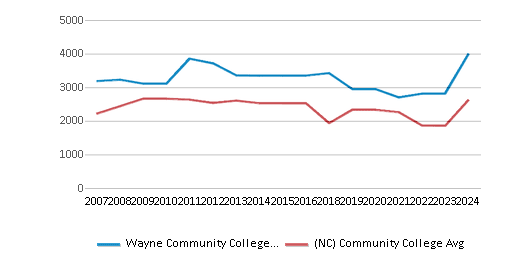
Student : Teacher Ratio
10:1
13:1
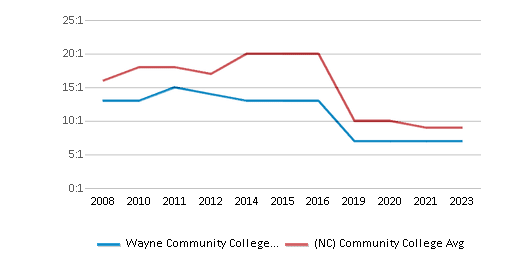
# Full-Time Students
1,206 students
766 students
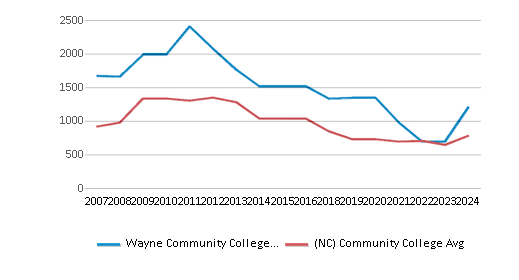
# Part-Time Students
2,790 students
1,813 students
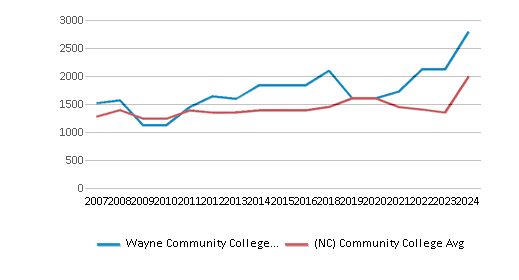
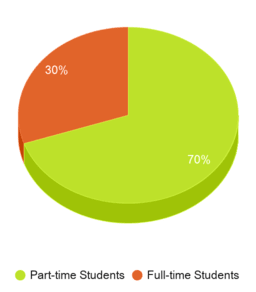
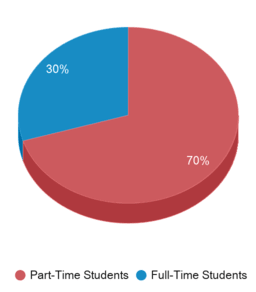
# Enrollment Undergraduate
399 students
316 students
# Full-Time Undergraduate Students
1,206 students
766 students
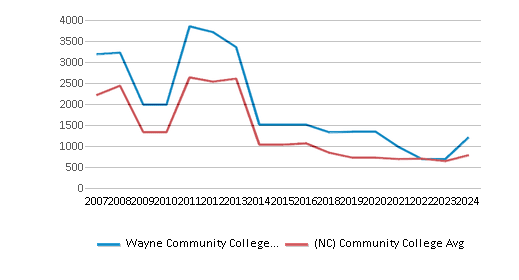
# Full-Time Graduate Students
n/a
22 students
# Part-Time Undergraduate Students
2,790 students
1,990 students
# Part-Time Graduate Students
n/a
3 students
Total Dormitory Capacity
n/a
717 students
% American Indian/Alaskan
1%
1%
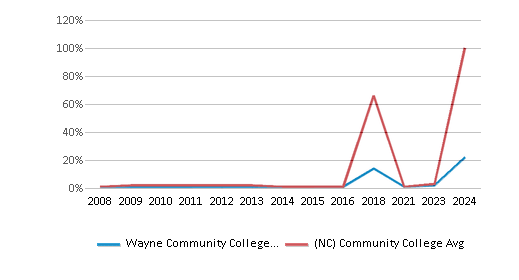
% Asian
2%
3%
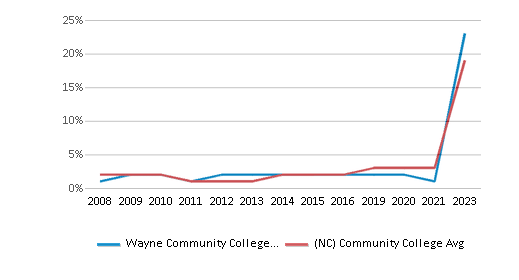
% Hispanic
18%
13%
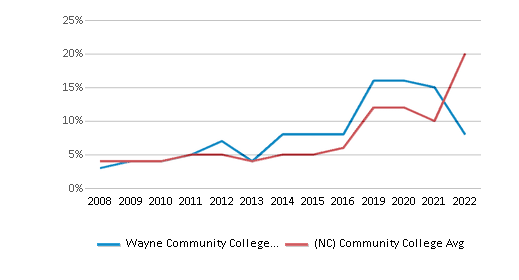
% Black
24%
21%
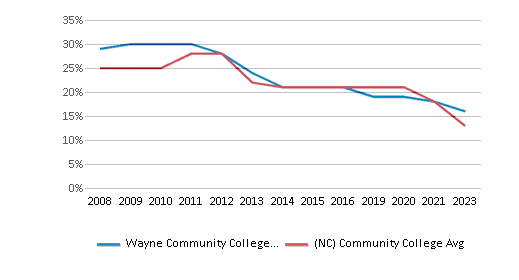
% White
52%
52%
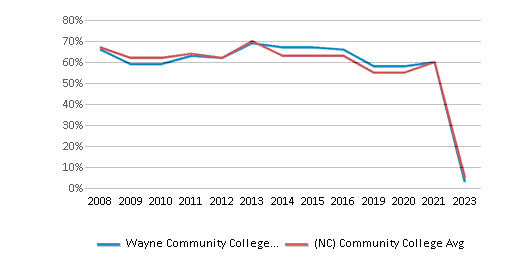
% Hawaiian
n/a
1%
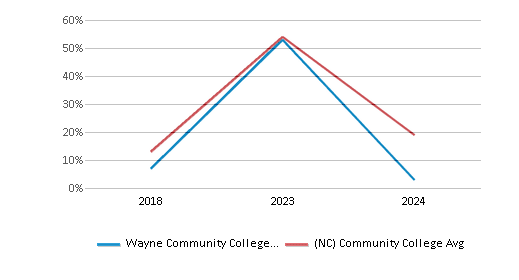
% Two or more races
2%
3%
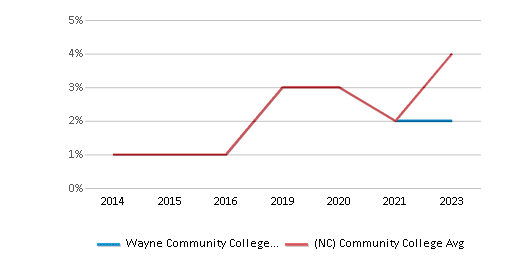
% Non Resident races
1%
1%
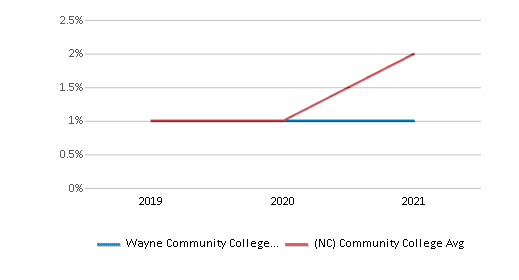
% Unknown races
1%
5%
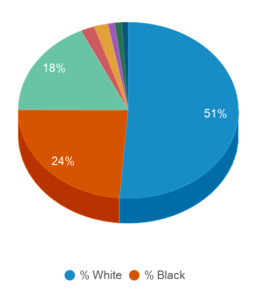
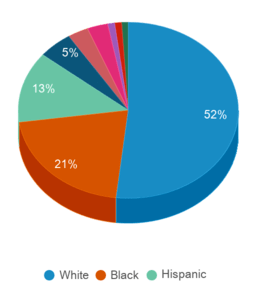
Diversity Score
0.64
0.66
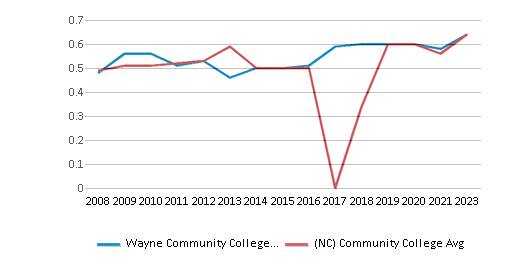
College Completion Rate (Students who graduate in less than 4 years)
0.4852%
0.3684%
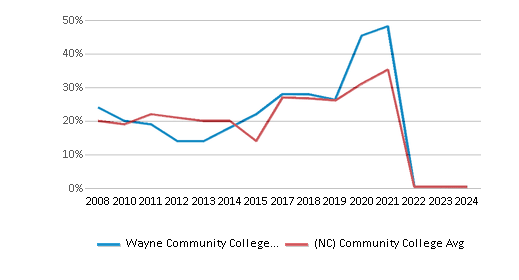
College Completion Rate (Students who graduate in 4 years or more than 4 years)
n/a
0.4286%
Average Graduate Earnings (10 Years)
$29,500
$27,500
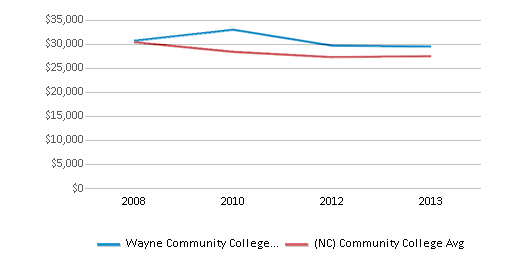
Tuition and Acceptance Rate
The public in-state tuition of $2,396 is less than the state average of $3,915. The in-state tuition has declined by 5% over four years.
The public out-state tuition of $8,540 is less than the state average of $9,508. The out-state tuition has stayed relatively flat over four years.
In-State Tuition Fees
$2,396
$3,915
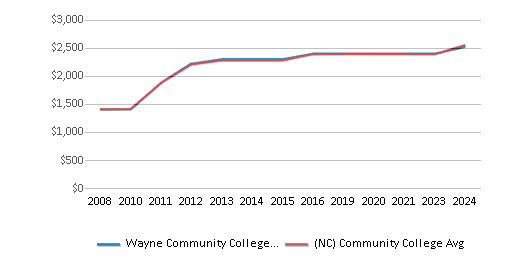
Out-State Tuition Fees
$8,540
$9,508
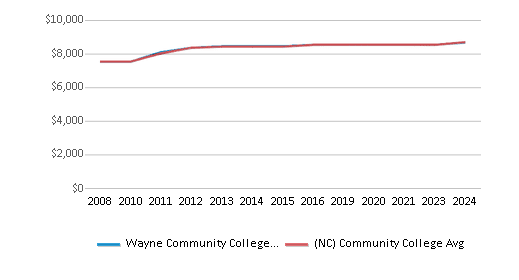
% Students Receiving Some Financial Aid
57%
82%
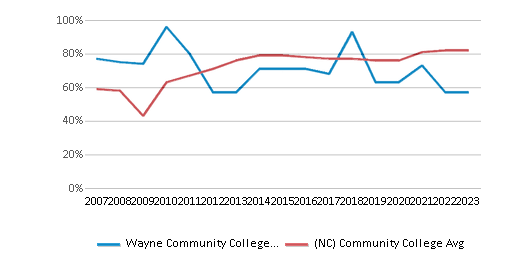
Median Debt for Graduates
$6,500
$11,865
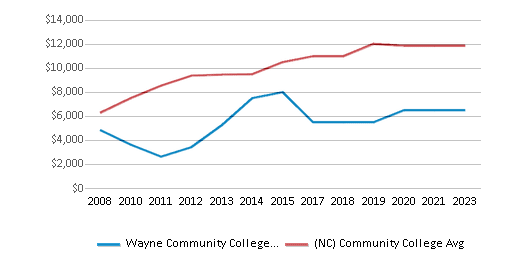
Median Debt for Dropouts
$4,750
$5,846
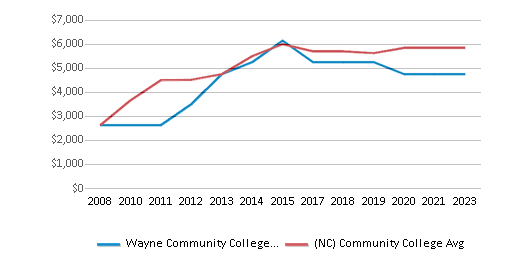
Acceptance Rate
n/a
82%
SAT Reading
n/a
488
SAT Math
n/a
498
ACT Composite
n/a
20
ACT English
n/a
13
ACT Math
n/a
16
Source: 2024 (or latest year available) Integrated Postsecondary Education Data System (IPEDS) , School Administrators
School Notes
- A member of the rapidly growing system of 58 community and technical colleges, Wayne Community College was established as Goldsboro Industrial Education Center on June 15, 1957. The original on-campus building was completed in November 1960, and until Fall 1962 all courses were taught in the evening, and all students were part-time. In the 1962-63 school year, the first full-time courses were offered leading to diplomas in automotive mechanics, electronics, drafting, and practical nursing. During the 1962-63 school year, Goldsboro I.E.C. had 47 students enrolled with eight faculty members. During 1963 through 1965 three extension units of Goldsboro I.E.C. were established in Morehead City, Kenansville, and Clinton; later to become Carteret, James Sprunt, and Sampson Community Colleges. In January 1964, Goldsboro I.E.C. became Wayne Technical Institute. Wayne Community College is located in Goldsboro at 3000 Wayne Memorial Drive. Seven modern buildings on a new campus contain more than 287,000 square feet of state-of-the-art classrooms, laboratories, and offices. In 1996 Wayne Community College completed a campus development project which had been underway for 22 years. Three phases of construction during this time have provided more than $30 million in new buildings on more than 165 acres of property. Wayne Community College is a member of the North Carolina Community College system. Located in Goldsboro, the college serves Wayne and adjoining counties. WCC offers classes on base that transfer to four-year institutions, as well as those that lead to an Associate of Applied Science degree. On campus, we have more than four dozen curriculum programs in certifi cate, diploma, and associate degree areas, with a full range of support services and a reputation for quality. Using your background in military technology, you can find promising opportunities in our technology related programs that will prepare you for a civilian career in areas such as Aviation Systems Technology, Electronics Engineering, Drafting and Design, Industrial Systems, Information Systems, Network Administration and Support, and more. Wayne Community College is accredited by the Commission on Colleges of the Southern Association of Colleges and Schools to award associate degrees.
Frequently Asked Questions
How much does Wayne Community College cost?
Wayne Community College's tuition is approximately $2,396 for In-State students and $8,540 for Out-State students.
What is Wayne Community College's ranking?
Wayne Community College ranks among the top 20% of community college in North Carolina for: Highest completion rates and Least debt for graduating students.
Recent Articles

Obtaining Your Bachelor's Degree at a Community College
Explore the evolving landscape of community colleges offering bachelor's degrees, addressing affordability, accessibility, and workforce needs.

A to Z of Community College Certificates and Courses
From business and healthcare to technology and skilled trades, the article showcases the breadth of options available to students seeking to enhance their knowledge, develop new skills, or pursue career advancement.

What is a Community College?
This comprehensive guide explains what a community college is, its history, and its role in higher education. It covers the types of programs offered, differences from four-year colleges, benefits of attending, and important considerations for prospective students, providing valuable insights for those exploring educational options.









